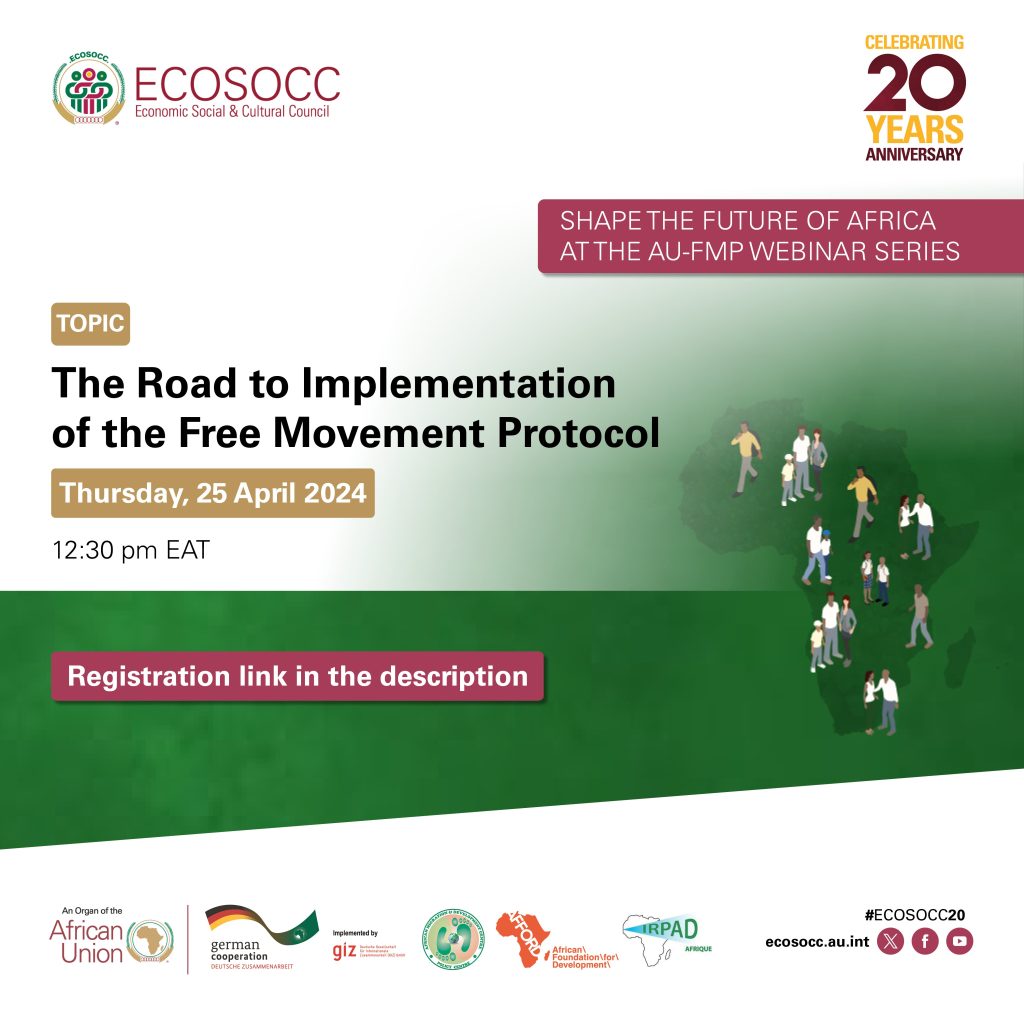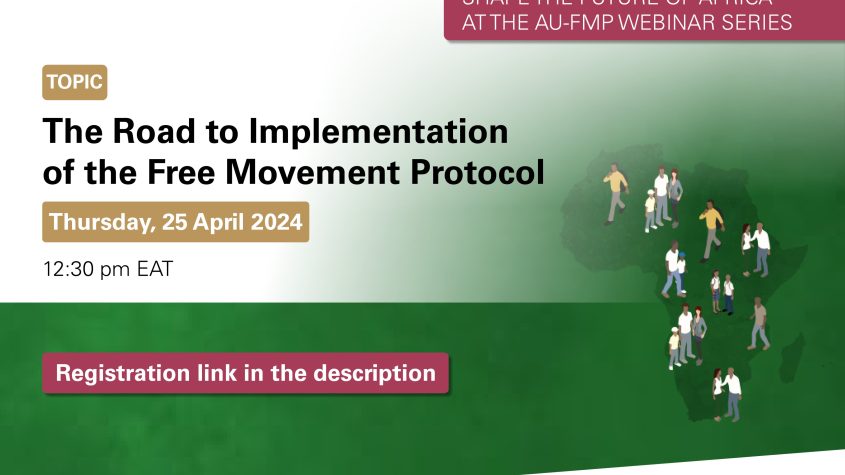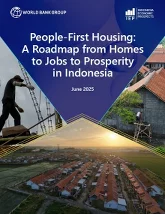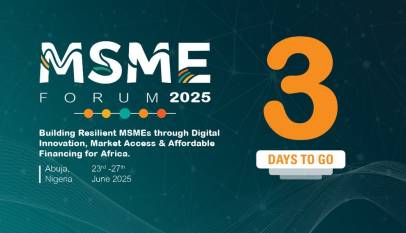ECOSOCC, GIZ Wrap-up Webinar Series on AU Free Movement Protocol
The African Union Economic, Social and Cultural Council (ECOSOCC) and the Deutsche Gesellschaft für Internationale Zusammenarbeit (GIZ) recently concluded their year-long webinar series aimed at demystifying the African Union Free Movement Protocol (AU-FMP).

The webinar series titled “Mobilising Africa: Promoting Free Movement for Growth and Development,” fostered dialogue on the African Union Free Movement Protocol (AU-FMP) as well as unpacking the myths and misconceptions about labour migration and free movement in Africa.
The series offered invaluable insights and crucial strategies towards the effective removal of barriers to mobility and fostering free, safe and orderly movement of persons within Africa. The webinars featured thought-provoking presentations by subject-matter experts, discussions by panels of experts as well as open discussions among participants around an effective pathway to the implementation of the Free Movement Protocol.
It is worthy of note that whereas the Protocol to the Treaty Establishing the African Economic Community relating to Free Movement of Persons, Right of Residence, and Right of Establishment (AU-FMP) has been signed by more than half of AU Member States, only 4 Member States have ratified the Protocol. This is in stark contrast to the African Continental Free Trade Area (AfCFTA) Agreement, which has received almost universal signature and ratification.
In his opening remarks at the concluding webinar, Mr William Carew, Head of ECOSOCC Secretariat, highlighted the transformative potential of the AU FMP, emphasizing its role in establishing a continental framework for the movement of people, fostering integration and promotion of pan-African unity among AU Member States. Carew thus underscored the importance of understanding the nexus between labor migration and trade, stressing that trade cannot thrive without free movement of people.
Consequently, Carew urged Member States to ratify the AU-FMP, highlighting the need for continuous dialogue and engagement among stakeholders to maximize the Protocol’s benefits. He noted that the ECOSOCC-GIZ AU-FMP Webinar Series had managed to cover the various concerns of Member States about the FMP and the practical implications of its implementation, including security concerns.
“Free movement is a complex issue that presents a range of challenges but also opportunities. Yet, alongside its benefits, free movement of people also comes with security concerns. Therefore, it is crucial to strike a balance between the promotion of the free movement of people and ensuring the safety and security of migrants,” Mr Carew stated.
Diego Arcarazo, a professor of European and Migration Law at the University of Bristol, emphasized the crucial role of both state and non-state actors in ensuring the adoption of the AU-FMP by Member States, noting that free movement agreements – which allow nationals of participating states to move, reside, and work freely in other participating states – were markedly different from visa liberalization and labor agreements.
The university don noted that free movement regimes have become increasingly common in the past 30 years, attributing this trend to the rise in regional organizations in the post-Cold War era and the inclusion of migration as a key element of the regional groupings’ agenda. He pointed out that out of the 193 UN member countries, 104 belong to functioning free movement regimes across Europe, Eurasia, South America, the Caribbean, and Africa.
However, Professor Arcarazo said getting countries to ratify free movement protocols requires building coalitions among both state and non-state actors across the political spectrum, as seen in Argentina’s ratification of the Mercosur Residence Agreement. He noted that the provisions of the AU’s Free Movement Protocol do not prevent State Parties from either unilaterally applying or suspending the Protocol’s provisions against other State Parties, or even bilaterally commencing a ratification process.
“It’s important to understand that in order to gather support for the ratification of a protocol of this nature, you need a larger spectrum of actors, agencies, both inside the government and outside the government, namely business groups, labour unions, NGOs. They are all very important. Patience is also key in the process as, for instance, it took Paraguay seven years to ratify the Mercosur Residence Agreement, making it the last country to do so.”
Also speaking at the final edition of the ECOSOCC-GIZ FMP webinar series, Mr Brian Chigawa, a Migration Advisor at the Common Market for Eastern and Southern Africa (COMESA), said the challenges being faced by the AU-FMP were akin to those encountered by the Regional Economic Communities (RECs) in implementing their own free movement protocols.
Yet, Chigawa said sustained advocacy will help raise awareness and foster a deeper understanding of the benefits of signing and ratifying the FMP by Member States, as well as dispel misconceptions about the Protocol. To this end, he said, it was imperative to contextualize the importance of the Protocol in all discussions on free movement, by emphasizing the interconnectedness between migration and trade, on the one hand, and the role of free movement as a facilitator of intra-African trade, on the other hand.
Therefore, Chigawa recommended the establishment of a robust monitoring and evaluation mechanism to track countries’ progress in signing, ratifying, and implementing the Protocol, drawing inspiration from successful models like the COMESA Visa Protocol and offering innovative incentives to encourage adherence to the FMP’s provisions.
“We also need to ensure there is proper coordination at the national level. One ministry alone, for example, the ministry responsible for immigration, cannot tackle this matter alone at the national level. Let’s try to establish national structures that will coordinate efforts towards designing ratification and implementation of the Free Movement Protocol using the whole‑of‑government and whole‑of‑society approach.”
Chigawa also emphasized the importance of continuous capacity building among stakeholders at national level, especially in the area of border management, through a strong focus on integrated and Coordinated Border Management (CBM), to build confidence and trust in the implementation of the provisions of the Protocol among Member States of the AU.
The ECOSOCC-GIZ AU-FMP webinar series was launched in April 2023 with the inaugural webinar themed: ‘Transcending Migration Challenges and Creating Opportunities for Africa’ focused on how the removal of barriers to mobility will foster an environment for free movement of persons within Africa. The second webinar of the series was held in June 2023, which focused on the strong interrelationship between movement of people and trade.
The third installment of the webinar series (October 2023) delved into the significance of the social protection of labor migrants and their skills’ development. The same month, discussions at the fourth webinar blamed the lump-of-labor fallacy for the discrimination of African labor migrants in Africa. In February 2024, the fifth webinar of the series focused on allaying the fears of AU countries regarding free movement of persons posing security threats.












